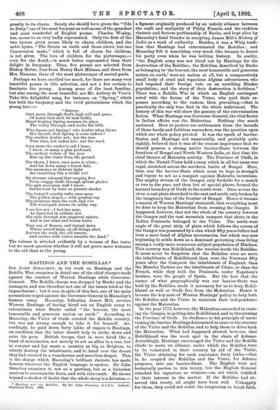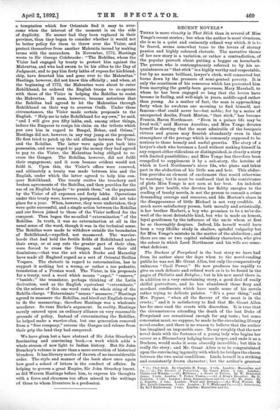HASTINGS AND THE ROHILLAS.* Sin JOHN STRACHEY, in his work
on Hastings and the Rohilla War, examines in detail one of the chief charges made against the conduct of Warren Hastings while Governor- General. The Rohilla charge was dropped by Burke and the managers, and was therefore not one of the issues tried at the impeachment ; but it was, in spite of this fact, one of the main accusations urged against the Governor-General in Macaulay's famous essay. Macaulay, following James Mill, accuses Warren Hastings of having hired out an English army to exterminate what Burke called "the bravest, the most honourable and generous nation on earth." According to Macaulay, the Vizier of Oudh coveted the Rohilla country, but was not strong enough to take it for himself. Ac- cordingly, he paid down forty lakhs of rupees to Hastings, on condition that the latter should help to strike down and seize his prey. British troops, that is, were hired like a band of mercenaries, not merely to act as allies in a war, but to conquer and lay waste a country as big as Belgium, to utterly destroy the inhabitants, and to hand over the desert they had created to a treacherous and merciless despot. This is the charge which Macatilay's brilliant rhetoric has made famous wherever the English language is spoken. Sir John Strachey examines it, not as a partisan, but as a historian anxious to ascertain the facts, and with this result. He shows beyond a shadow of doubt that the whole story is a delusion,—
• Hastinge and the Rohl-Batt. By Sir John Strachey, G.C.S I. Oxford Clarendon Press. 1892,
a figment originally produced by an unholy alliance between the craft and malignity of Philip Francis, and the reckless rhetoric and furious partisanship of Burke, and kept alive by Macaulay's fatal blunder in accepting James Mill's History of India as a work of authority. Besides, it was a Whig tradi- tion that Hastings had exterminated the Rohillas; and Macaulay felt it something very much like treason to desert his party even when he was writing history. In reality, "the English army was not hired out by Hastings for the destruction of the Rohillas; the Rohillas, described by Burke as belonging to 'the bravest, the most honourable and generous nation on earth,' were no nation at all, but a comparatively small body of cruel and rapacious Afghan adventurers, who had imposed their foreign rule on an unwilling Hindoo population ; and the story of their destruction is fictitious." There was a Rohilla War in which an English contingent acted with the forces of the Vizier, who paid their ex- penses according to the custom then prevailing,—that is practically the only true fact in the whole indictment. The history of this war will show the genesis of the extermination fiction. When Hastings was Governor-General, the vital factor in Indian affairs was the Mahrattas. Nothing else much mattered. How to protect our settlements from the inroads of these hardy and faithless marauders, was the question upon which our whole policy pivoted. It was the epoch of barrier- States, and Hastings not unnaturally, and probably quite rightly, believed that it was of the utmost importance that we should possess a strong native barrier-State between the frontiers of Bengal and North-Western India, at that time the chief theatre of Mahratta activity. The Province of Oudh, in which the Nawab Vizier held a sway which in all but name was regal, stretched across the northern limits of Bengal. Here, then, was the barrier-State which must be kept in strength and vigour to act as a rampart against Mahratta incursions. The mighty stream of the Ganges, only fordable for a month or two in the year, and then but at special places, formed the natural boundary of Ondh to the north-west. Once across the river, avast plain stretched to the east and south, only broken by the imaginary line of the frontier of Bengal. Hence it became a maxim of Warren Hastings' statecraft, that everything must be done to keep the Mahrattas from crossing the Ganges. It happened, however, that not the whole of the country between the Ganges and the vast mountain rampart that shuts in the Indian Peninsula belonged to the Vizier. The north-west angle of the great strip of plain which follows the course of the Ganges was possessed by a clan which fifty years before had been a mere band of Afghan mercenaries, but which was now beginning to settle down as a dominant governing class living among a vastly more numerous subject-population of Hindoos. This country was Rohilkhand, the warrior-horde the Rohillas. It must never be forgotten that the Rohillas were no more the inhabitants of Rohilkhand, than were the Normans fifty years after the Conquest the inhabitants of England, than the Manchu Tartars are the inhabitants of China, or than the French, while they held the Peninsula under Napoleon's brother, were the people of Spain. But the fact that the corner of what geographically was our barrier-State was held by the Rohillas, made it necessary for us to keep Rohl- khand as well as Oudh free from the Mahrattas. Hence it became the key-note of Warren Hastings' policy to help both the Rohillas and the Vizier to maintain their independence against the Mahrattas.
In the year 1772, however, the Mahrattas succeeded in cross- ing the Ganges, in getting into Rohilkhand, and in threatening the Province of Oudh. In obedience to his principle of main- taining the barrier, Hastings determined to come to the succour of the Vizier and the Rohillas, and to help them to drive back the Mahrattas. What had happened showed, however, that Rohilkhand was the weak spot in the chain of defence. Accordingly, Hastings encouraged the Vizier and the Rohilla chiefs to make an alliance, under which the Rohillas were to be 'reinstated in their country by aid of the Vizier, the Vizier obtaining for such assistance forty lakhs,—that is, he coupled the Rohillas and the Vizier, for defence purposes, into one barrier-State. The English were not technically parties to this treaty, but the English General attached his signatirre as witness,—an act which testified to their interest in the matter. If the Rohillas had ob- served this treaty, all might have been well. Unhappily for them, they could not resist the temptation to break faith,
a temptation which few Orientals find it easy to over- come when the interest of the moment is on the side of duplicity. No sooner had they been replaced in their province, than they began to consider whether it would not be better policy for them to throw over the Vizier, and protect themselves from another Mahratta inroad by making terms with the marauders. In November, 1772, Hastings wrote to Sir George Colebrooke : "The Rohillas, whom the Vizier had engaged by treaty to protect him against the Mahrattas, and who had sworn to be his allies to the Day of Judgment, and to pay him forty lakhs of rupees for his friend- ship, have deserted him and gone over to the Mahrattas." Hastings, however, did not know this officially ; and when, at the beginning of 1773, the Mahrattas were about to enter Rohilkhand, be ordered the English troops to co-operate with those of the Vizier in helping the Rohillas to resist the Mahrattas. It soon, however, became notorious that the Rohillas had agreed to let the Mahrattas through Rohilkhand on their way to overrun Oadh. Under these circumstances, the Vizier made certain proposals to the English. "Help me to take Rohilkhand for my own," he said, "and I will give you fifty lakhs, and, among other things, induce the Emperor to resign his claim on the tribute which you owe him in regard to Bengal, Behar, and Orissa," Hastings did not, however, in any way jump at the proposal. He first tried to patch up the old alliance between the Vizier and the Rohillas. The latter were again put back into possession, and were urged to pay the money they had agreed to pay to the Vizier, the Mahrattas being obliged to re- cross the Ganges. The Rohillas, however, did not fulfil their engagement, and it soon became evident would not fulfil it. Upon this, the Vizier's offers were renewed, and ultimately a. treaty was made between him and the English, under which the latter agreed to help him con- quer Rohilkhand. The treaty recites the treachery and broken agreements of the Rohillas, and then provides for the use of an English brigade "to punish them," on the payment by the Vizier of all expenses and forty lakhs. Operations under this treaty were, however, 'postponed, and did not take place for a year. When, however, they were undertaken, they were quite successful, and a single action between the Rohillas and our forces joined to those of the Vizier sufficed for the conquest. Then began the so-called " extermination " of the Rohillas. In truth, it was no extermination at all in the usual sense of the word, though it was in the technical sense. The Rohillas were made to withdraw outside the boundaries of Rohilkhand,—expelled, not massacred. The warrior- horde that had held the fertile fields of Rohilkhand under their sway, or at any rate the greater part of their clan, were forced to cross the Ganges, and leave their old dominions,—that was the act which Burke and Macaulay have made all England regard as a sort of Oriental Sicilian Vespers. The rhetoric in regard to extermination, has to support it nothing but a wrong, or rather a too pedantic, translation of a Persian word. The Vizier, in his, proposals for a treaty, used a word which means "expel," "remove," " banish ;" the translator, perhaps thinking of the Latin derivation, used as the English equivalent "exterminate." On the misuse of this one word rests the whole sting of the Rohilla charge. " Exterminate " means "massacre ;" Hastings agreed to massacre the Robillas, and hired out English troops to do the massacring; therefore Hastings was a wholesale murderer. So runs Burke's argument. In reality, Hastings merely entered upon an ordinary alliance on very reasonable grounds of policy. Instead of exterminating the Rohillas, be helped make a warrior-clan, but one generation removed from a "free company," recross the Ganges and release from their grip the land they had conquered.
We have given but a bare abstract of Sir John Strachey's fascinating and convincing book,—a work which adds a whole stream of new light to Indian history. But Sir John Strachey's volume is more than a mere correction of historical blunders. It has literary merits of its own of no inconsiderable order. The style and manner of the book show once again bow good a school of letters is the conduct of affairs. In helping to govern a great Empire, Sir John Strachey learnt, as did Warren Hastings before him, to express his thoughts with a force and clearness too often missed in the writings of those to whom literature is a profession.



































 Previous page
Previous page